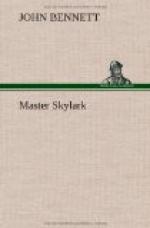“Thy mother should come to live with us, and thy father, and all thy kin,” said Cicely, dreamily smiling; “and the people would love us, there would be no more war, and we should be happy forevermore.”
But Nick was listening,—not to her,—and his face was a little pale. He felt a strange, uneasy sense of some one staring at his back. He whirled about—looked in at the tap-room window. For an instant a peering face was there; then it was gone—there was only the Dutchman’s frowzy wig and striped woolen cap. But the voice he had heard and the face he had seen were the voice and the face of Gregory Goole.
“I should love to see thy mother, Nick,” said Cicely.
He got up steadily, though his heart was jolting his very ribs. “Thou shalt right speedily!” said he.
The carts were standing in a line. The carrier came down the steps with his stirrup-cup in hand. Nick’s heart gave a sudden, wild, resolute leap, and he touched the carrier on the arm. “What will ye charge to carry two as far as Stratford town?” he asked. His mouth was dry as a dusty road, for the Dutchman had risen from his seat and was coming toward the door.
“I do na haul past Oxford,” said the man.
“To Oxford, then—how much? Be quick!” Nick thrust his hand into his breast where he carried the burgesses’ chain.
“Eightpence the day, for three days out—two shilling ’tis, and find yourself; it is an honest fare.”
The tapster’s knave came down the steps; the Dutchman stood within the shadow of the door.
“Wilt carry us for this?” Nick cried, and thrust the chain into the fellow’s hands.
He gasped and almost let it fall. “Beshrew my heart! Gadzooks!” said he, “art thou a prince in hiding, boy? ’T would buy me, horses, wains, and all. Why, man alive, ‘tis but a nip o’ this!”
“Good, then,” said Nick, “’tis done—we’ll go. Come, Cicely, we’re going home!”
Staring, the carrier followed him, weighing the chain in his hairy hand. “Who art thou, boy?” he cried again. “This matter hath a queer look.”
“’Twas honestly come by, sir,” cried Nick, no longer able to conceal a quiver in his voice, “and my name is Nicholas Attwood; I come from Stratford town.”
“Stratford-on-Avon? Why, art kin to Tanner Simon Attwood there, Attwood of Old Town?”
“He is my father, sir. Oh, leave us go with thee—take the whole chain!”
Slap went the carrier’s cap in the dirt! “Leave thee go wi’ me? Gadzooks!” he cried, “my name be John Saddler—why, what? my daddy liveth in Chapel lane, behind Will Underhill’s. I stole thy father’s apples fifteen years. What! go wi’ me? Get on the wain, thou little fool—get on all the wains I own, and a plague upon thine eightpence, lad! Why, here; Hal telled me thou wert dead, or lost, or some such fairy tale! Up on the sheepskin, both o’ ye!”
The Dutchman came from the tap-room door and spoke to the tapster’s knave; but the words which he spoke to that tapster’s knave were anything but Dutch.




